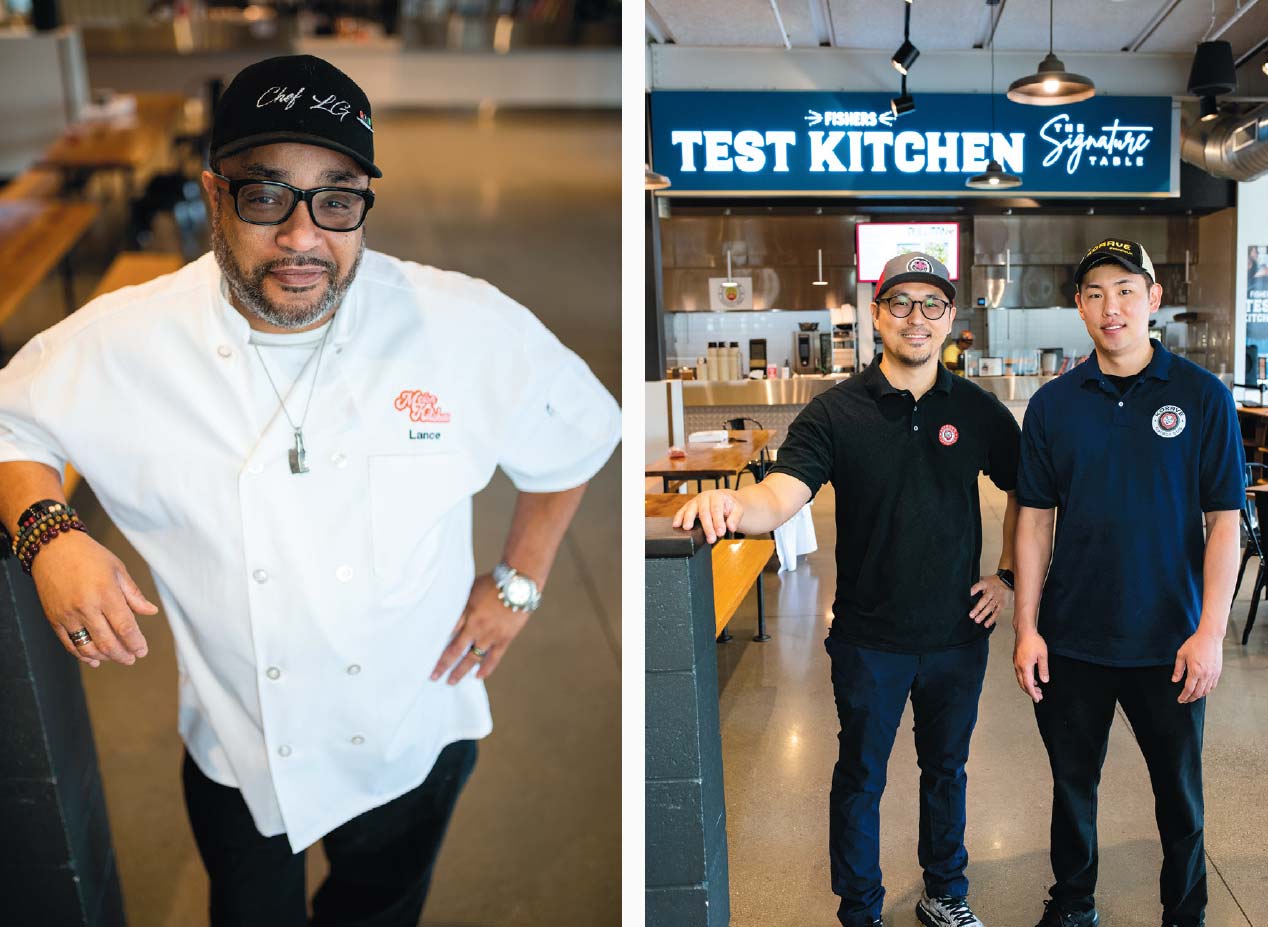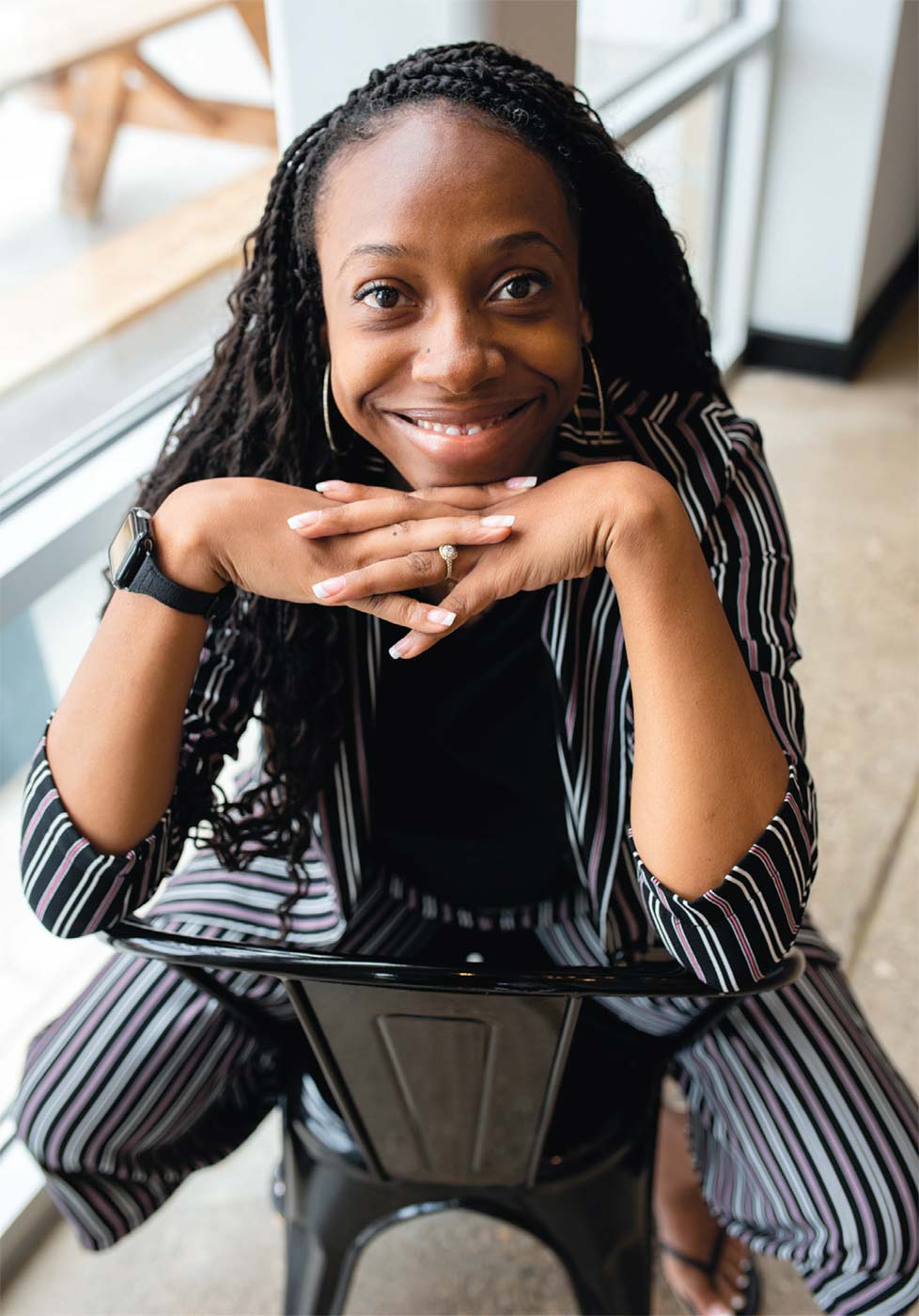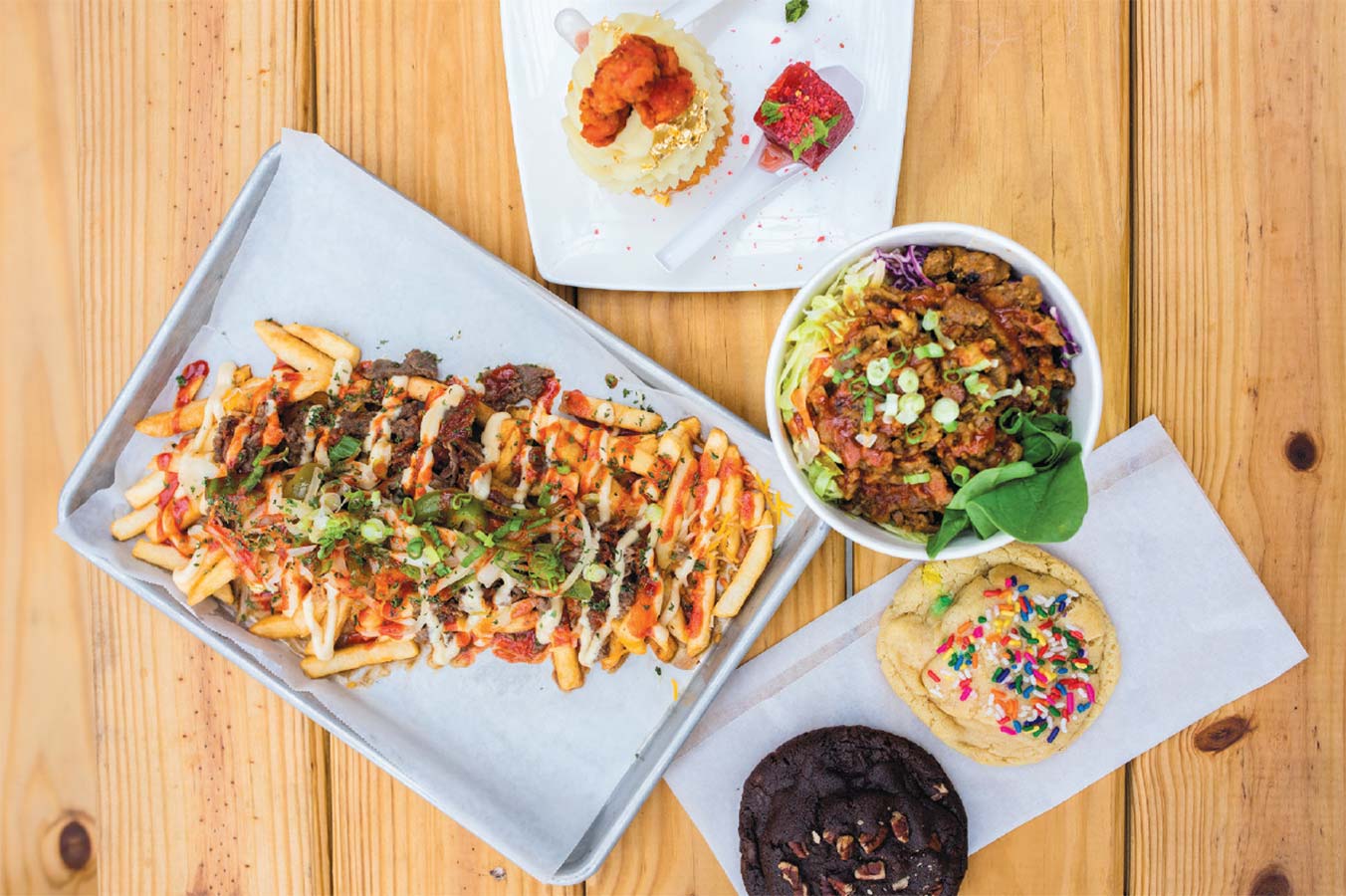Innovation is on the Menu

Top photo: Korean bowl and poutine from Korave (left and right); Buffalo chicken tenders with whipped potatoes on a corn muffin topped with gold flakes from FlavorUnit (above). Bottom row: Lance George of FlavorUnit; the Jung brothers, chefs at Korave.
I journey along Indiana Avenue. It’s two miles reach from Mile Square to the new 16 Tech Innovation District, a real-estate development for biosciences, technology, craft-making and, of course, food. At the beginning of the 20th century, the street formed the nucleus of Indianapolis’s burgeoning Black middle-class. It hummed with life, bustling markets, jazz clubs and eateries with names such as Page’s Café, The Coffee Pot and The People’s Restaurant.
Advertisements gave some hints to the dishes served at these establishments but “so much has been lost,” grieves Steve Barrett, Marion County historian for the Indiana Historical Center. “No one seemed to think of collecting [menus] for posterity.” In an email he lists: “The People’s Restaurant advertised as a ‘short order house and chili parlor.’ Lasley’s billed themselves with ‘home cooking.’ Log Cabin offered ‘old Southern-style barbeque’ and The Coffee Pot served ‘salad and sandwiches.’”
Black American families thrived along with this beloved shopping neighborhood for almost a century beginning in the 1850s. Earlier this year, the Terre Haute Tribune- Star reported that by 1920 the 10-acre community included “150 single-family homes, 33 restaurants, 26 grocery stores, 16 clothing shops and a black medical practice.”
As a centerpiece, C.J. Walker, the first Black multi-millionaire, opened her cosmetics business creating well-paying jobs, which aided in shaping this area known as the “Indianapolis Harlem.” Now, more than a hundred years have passed, scarred with rampant social injustices, urban blight and civil rights protests, and optimism seems to brew anew with this reinvention.
“We knew there should be a program to help people of color accelerate through the restaurant process. I found out some of my chefs were running into issues having access to kitchens or being certified. As an entrepreneur hiring experienced, high-end chefs and building a brand, I knew this was a long-term issue.” —Jazmine Long, program director for Melon Kitchen
At the northernmost tip where Fall Creek flows into White Water River lies the campus as mentioned above. When finished, it will have cute single names or acronyms to map out the series of buildings. To a visitor, the project feels like Russian nesting dolls: One prominent location with smaller parts within. Open one, discover another. The purpose of each offers economic security while nurturing future leaders and businesses. Enter HqO. Behind the Brutalist-style architectural entry, guests find similar single-moniker enterprises. The first example, 1776, promoted early in the construction, offers a global workspace network used by tech and business disrupters. Locations exist in Philadelphia and Berlin.
Machyne presents the largest and arguably best-equipped maker space and room rentals in Indianapolis. Yesterday, a crafter might want to weld a sculpture. Today, they can produce a ceramic pot, and tomorrow, print a 3D schematic. Finally, we get to AMP, an acronym for Artisan Market Place, making it the second of two food halls to open during the pandemic. (The Garage at Bottleworks District successfully launched in the beginning of 2021.) Out of the three connected edifices it engages the public the most. After all, this is where everyone will eat, drink and, if all goes well, repeat the process daily.
Found in the former Indianapolis Water Company structure, the overall plan doesn’t feature clothing stores or doctors yet. Still, it does offer a cavernous interior allowing for a variety of dining and drinking. Instead of the usual shopping center food court, the architects appropriated recycled shipping containers, thus setting up individual cooking kiosks and a special-events stage. In many ways, it reminds me of an indoor version of the Downtown Container Park in Las Vegas, also a small business incubator built by the late technology entrepreneur Tony Hsieh.
In August 2020, the Federal Reserve Bank of New York exposed the fragility of proprietorship for people of color: 41% of Black companies shut down, Latinx-owned businesses declined by 32% and Asians lost 26% compared to 17% of Caucasian establishments.
I meet Jazmine Long here, the program director for Melon Kitchen, a restaurant accelerator and ghost commissary, launched by the nonprofit BeNimble Foundation. We try and chat at one of the many empty tables in front of the new concept from Turchetti’s Salumeria folks. The 450,000-square-foot space feels vacant, and the music echoes in the vastness. Plus, the smell of baking pepperoni pies wafts past us, a distraction with the opening and closing of oven doors echoing. So, we move closer to the business location, situated in the northernmost corner.
Right now, it’s bare, consisting only of an industrial staircase leading to a door and cement walls, a direct result of a broken restaurant supply chain due to the coronavirus. Ironically, many of these start-ups wait for stoves, refrigerators and utensils. Their commercial appliances bob on some faraway ocean in the shipping containers not so different from the ones making up the décor here. Figurative and literal, the cornerstone location promises to be a success of Be Nimble Foundations, a nonprofit funding people of color and LGBTQIA+ enterprises.
According to BeNimble’s website, the 501(c)3 builds minority businesses by “taking a qualitative and quantitative approach” with an intent on training and placement programs. This includes teaching business curriculums that support individuals from marginalized populations and assist in finding money to fund them.
Long, a former paralegal, came to the restaurant industry by producing pop-up dining experiences under her banner Savor317. “I met Kelli N. Johnson, one of the BeNimble project directors, as I was making one of my monthly dinners,” she says. “We met up one day and talked about this idea. We knew there should be a program to help people of color accelerate through the restaurant process. I found out some of my chefs were running into issues having access to kitchens or being certified. As an entrepreneur hiring experienced, high-end chefs and building a brand, I knew this was a long-term issue.”
From that moment, Melon Kitchen ceased to be a concept and turned into a fledgling small business. Long describes it as “a partnership with 16 Tech: Food entrepreneurs apply. If accepted, they will be entered into a three-month program allowing them to take their test concept to a hopeful moneymaker. We hope that the participant will be prepared to open their idea into a takeout, delivery or full-service brick-and-mortar.” Applicants learn more about running a food company, including finalizing business plans, investor pitching, menu pricing and revenue strategy.
One of those chosen from a lengthy list of applicants is Lance George, formerly of the counter service Comida. Had the world not seen a health crisis, his restaurant could have celebrated two years. Unfortunately, it became just one of the city’s many causalities. His new company, FlavorUnit, promises to highlight the same ethnic fusion cuisine as Comida: Mexican and Asian flavors melded with American staples.
“BeNimble has a great reputation,” says George, a 30-year kitchen veteran. “They are doing a lot of wonderful things and supplying opportunities to the community. It’s offering me the prospect to regroup while still being creative. I think this is a perfect chance for my cooking to shine.”
“I’m a little different than the others because I have a little bit of time under my belt,” says the chef, who has garnered praise in local Indianapolis media. He appeared on WTHR and his restaurant was recommended by Indianapolis Monthly. “My restaurant didn’t have a liquor license, so we didn’t see big in-dining crowds. But once folks started coming in and trying our food, they kept coming back with their friends. We started these successful upscale brunches on Saturdays, then Covid-19 came along, and we had to shut things down.”
George continues, “I have always been in the back of the house, cooking. I’ve always had somebody or a family member with whom I worked as the financial person. As an applicant, I have an opportunity to learn more about the financial aspect of owning a business. To take more ownership in what I build.”
Twenty miles away, Chef Jung (“John”) Gyu Kim, coowner of Korave, a popular Korean American stall at Fishers Test Kitchen, echoes a similar and hopeful sentiment. He and his brother, Chef Jung (“Kim”) Min Kim, honed recipes from their birthplace of Seoul melded with tortillas, chips and fries. For example, they serve tacos stuffed with gochu (a spicy paste) pork, mee-chin nachos (galbi meatballs, Monterey Jack and gochujang), and bulgogi (marinated grilled beef) poutine.
“We just signed our lease to open our Korave at Castleton Mall,” John says. “We were able to start as a food truck, and now we hope to become a franchise. And we were able to do it because we started at [Fishers Test Kitchen].”
Kim says their business focused on building a day business catering to workers. “We made sure we went where there were lots of offices. We also built our following by heading to special events like a marathon and breweries. Most breweries didn’t offer food, so we were able to provide it to their customers.”
Fishers Test Kitchen resides at The Yard at Fishers District. Co-founders John Wechsler and Jolene Ketzenberger opened the restaurant accelerator in February 2020, a month before the global crisis shuttered many shops. In conjunction with the City of Fishers, the venture consists of three booths and The Signature Table, where aspiring food entrepreneurs and culinary experts explore inventive fastcasual dining. The program provides short-term contracts to budding culinary artists who are evolving their tasty ideas with an exploratory dining public. The chefs cycle out, so new cooks get the opportunity to succeed.
“Our applicants come in with a much more developed concept than an incubator that’s nurturing ideas,” says Ketzenberger. Aiding in getting capricious diners through the door, the establishment shares a 350-seat, kid-friendly eating area with the award-winning Sun King Brewery and Tap Room. The new-build, master-planned enclave includes a multi-verse of retail, dining and living space.
No one will argue that last year challenged the restaurant and service trades and many other service-oriented institutions. The National Restaurant Association, the lobbying arm for the industry, reported sales of $659 billion (about $2,000 per person in the U.S.), down $240 billion (about $740 per person in the U.S.) from original projected estimates and more than 110,000 locations permanently or temporarily closed. In August 2020, the Federal Reserve Bank of New York exposed the fragility of proprietorship for people of color: 41% of Black companies shut down, Latinx-owned businesses declined by 32%, and Asians lost 26% compared to 17% of Caucasian establishments.
Derek Robinson, marketing director for the Houston-based nonprofit Black Restaurant Week, saw a rise in how many Circle City eateries joined from the debut year in 2019. “We did the best we could to ensure that those who participated were highlighted in 2020,” he says. “Our Indianapolis sophomore event maintained a great turnout. Unfortunately, some businesses which were with us in 2019 did close. There are razor-thin margins for the restaurant industry, and the health crisis didn’t help.”
Robinson mentions more destinations are seeking out his organization wanting to take part in forthcoming events. Positioned in 16 metro areas, he notes that participating eateries seem like community gems such as a bakery, food truck, or even a cocktail bar. He continued, “We have private chefs. We even have those restaurants that are delivery only and exist out of cloud kitchens. We have it all.”
“Ultimately, one major discovery, to our surprise, was that Midwest is a very tight-knit region. Folks traveled from Kansas City to St. Louis to Indianapolis to visit our highlighted list. They wanted to be supportive.” Indeed, the industry sees projected growth from that support.
Importantly for potential Black and Brown proprietors, opening a food business can reap dividends. Ghost kitchens like Melon Kitchen and minority eateries could become the norm rather than the exception. The number of Hispanic-owned restaurant businesses climbed 51% between 2007 and 2012. During that same period, Black-owned eateries leaped 49% and Asian-owned increased 18%. Due to this growth, four restaurants out of 10 are majority-owned by minorities.
At Melon Kitchen and Fishers Test Kitchen, beyond the statistics and numbers, building a successful business rewards itself. As if taking a cue from those who worked Indiana Avenue a hundred years ago, Chef George declares, “Whatever knowledge I can take from different people, I’m going to take. You’re never too old to learn.”

Jazmine Long
A report published in May 2020 by the global management consultancy McKinsey & Company suggests that even during the pandemic the odds are against approval of business loans for minority-owned operations.
The report says 60% of loans sought by white smallbusiness owners are approved, compared to 50% for Hispanic or Latinx and only 29% from Black applicants.
BeNimble is a nonprofit working to close the racial wealth gap through technology careers and entrepreneurship. Ghost kitchen and start-up accelerator Melon Kitchen is one of their concepts.
The AMP is an artisan marketplace and food hall in the 16 Tech Innovation District, and the home of restaurant accelerator Melon Kitchen.
TheAmpIndy.com
1220 Waterway Blvd., Indianapolis
Fishers Test Kitchen is a restaurant accelerator where you can meet the chefs, try the food and support the local food community.
FishersTestKitchen.com
9713 District North Dr., Suite #1210, Fishers, Indianapolis
Founded in 2016 by Warren Luckett, Falayn Ferrell and Derek Robinson, Black Restaurant Week is dedicated to celebrating the flavors of African American, African and Caribbean cuisine nationwide.
Follow Flavor Unit @IndyComida
Follow Korave Korean BBQ @Korave, Korave.us





